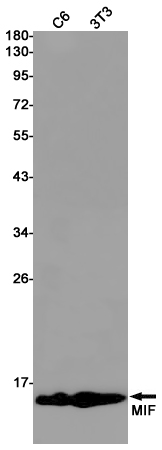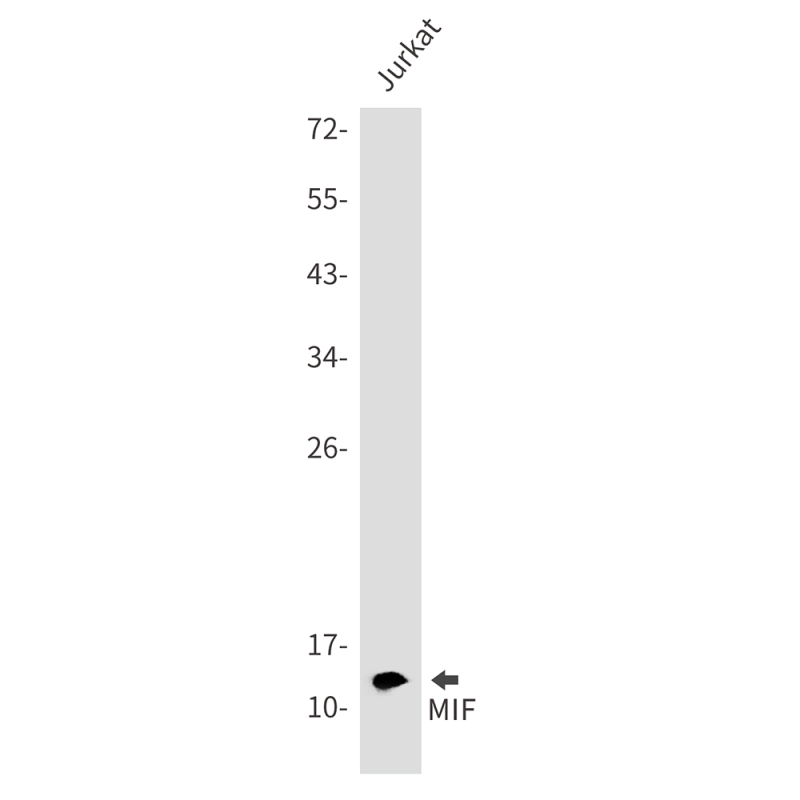

| WB | 1/500-1/1000 | Human,Mouse,Rat |
| IF | 咨询技术 | Human,Mouse,Rat |
| IHC | 咨询技术 | Human,Mouse,Rat |
| ICC | 技术咨询 | Human,Mouse,Rat |
| FCM | 咨询技术 | Human,Mouse,Rat |
| Elisa | 咨询技术 | Human,Mouse,Rat |
| Aliases | MIF; GLIF; MMIF; Macrophage migration inhibitory factor; MIF; Glycosylation-inhibiting factor; GIF; L-dopachrome isomerase; L-dopachrome tautomerase; Phenylpyruvate tautomerase |
| Entrez GeneID | 4282 |
| WB Predicted band size | Calculated MW: 12 kDa; Observed MW: 12 kDa |
| Host/Isotype | Rabbit IgG |
| Antibody Type | Primary antibody |
| Storage | Store at 4°C short term. Aliquot and store at -20°C long term. Avoid freeze/thaw cycles. |
| Species Reactivity | Human,Mouse,Rat |
| Immunogen | Recombinant protein of human MIF |
| Formulation | Purified antibody in TBS with 0.05% sodium azide,0.05%BSA and 50% glycerol. |
+ +
以下是关于MIF抗体的3篇代表性文献及其摘要内容的简要概括:
---
1. **文献名称**:*MIF is a pituitary-derived cytokine that potentiates lethal endotoxaemia*
**作者**:Calandra, T. et al.
**摘要**:该研究首次揭示了MIF(巨噬细胞移动抑制因子)在脓毒症中的关键作用。作者发现,MIF抗体可显著抑制内毒素诱导的炎症反应,降低实验动物死亡率,表明MIF是潜在的治疗靶点。
---
2. **文献名称**:*Targeting macrophage migration inhibitory factor in rheumatoid arthritis: A novel therapeutic approach*
**作者**:Murakami, H. et al.
**摘要**:研究探讨了抗MIF单克隆抗体在类风湿性关节炎模型中的疗效。结果显示,抗体能抑制滑膜炎症和关节破坏,通过阻断MIF与CD74受体的相互作用,为自身免疫疾病治疗提供了新策略。
---
3. **文献名称**:*Anti-MIF antibody inhibits melanoma cell migration and metastasis through suppression of EMT*
**作者**:Vera, P. L. et al.
**摘要**:该文献报道了抗MIF抗体通过抑制上皮间质转化(EMT)过程,显著降低黑色素瘤细胞的侵袭性和转移能力,提示MIF抗体在癌症治疗中的潜在应用价值。
---
如需更多文献或具体研究方向的扩展,请进一步说明!
**Background of MIF Antibodies**
Macrophage migration inhibitory factor (MIF) is a pleiotropic cytokine initially identified for its role in inhibiting macrophage migration. It plays critical roles in innate and adaptive immunity, inflammation, cell proliferation, and apoptosis. Structurally, MIF exhibits unique tautomerase and oxidoreductase enzymatic activities, though their physiological relevance remains debated. MIF interacts with receptors such as CD74. CXCR2. and CXCR4. activating downstream pathways like MAPK/ERK and PI3K/Akt, which drive pro-inflammatory and pro-tumorigenic responses.
Dysregulated MIF expression is linked to autoimmune diseases (e.g., rheumatoid arthritis), cancer progression, sepsis, and metabolic disorders. Elevated MIF levels correlate with poor prognosis in many cancers, promoting angiogenesis, metastasis, and immune evasion. These associations make MIF a therapeutic target.
MIF antibodies, including monoclonal and polyclonal variants, are designed to neutralize MIF activity. They block receptor binding, inhibit enzymatic functions, or promote MIF degradation. Preclinical studies show that anti-MIF antibodies reduce inflammation and tumor growth. Challenges include MIF's pleiotropic nature and interactions with multiple receptors, complicating therapeutic strategies. Current research focuses on optimizing antibody specificity and evaluating clinical efficacy, with some candidates in early-phase trials for cancer and autoimmune diseases.
In summary, MIF antibodies represent a promising tool for modulating MIF-driven pathologies, though further studies are needed to fully harness their therapeutic potential.
×